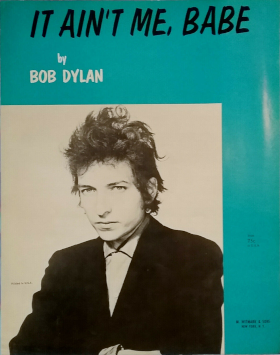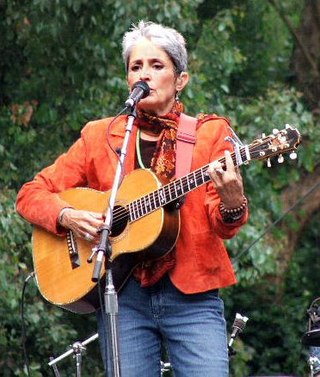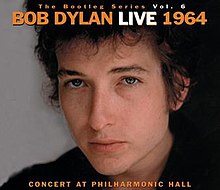
"It Ain't Me Babe" is a song by Bob Dylan that originally appeared on his fourth album Another Side of Bob Dylan, which was released in 1964 by Columbia Records. According to music critic Oliver Trager, this song, along with others on the album, marked a departure for Dylan as he began to explore the possibilities of language and deeper levels of the human experience. Within a year of its release, the song was picked up as a single by folk rock act the Turtles and country artist Johnny Cash.

"Silver Dagger", with variants such as "Katy Dear", "Molly Dear", "The Green Fields and Meadows", "Awake, Awake, Ye Drowsy Sleepers" and others, is an American folk ballad, whose origins lie possibly in Britain. These songs of different titles are closely related, and two strands in particular became popular in commercial Country music and Folk music recordings of the twentieth century: the "Silver Dagger" version popularised by Joan Baez, and the "Katy Dear" versions popularised by close harmony brother duets such as The Callahan Brothers, The Blue Sky Boys and The Louvin Brothers.

Live 1966: The "Royal Albert Hall" Concert is a two-disc live album by Bob Dylan, released in 1998. It is the second installment in the ongoing Bob Dylan Bootleg Series on Legacy Recordings, and has been certified a gold record by the RIAA. It was recorded at the Manchester Free Trade Hall during Dylan's world tour in 1966, though early bootlegs attributed the recording to the Royal Albert Hall so it became known as the Royal Albert Hall Concert. Extensively bootlegged for decades, it is an important document in the development of popular music during the 1960s.

The Bootleg Series Vol. 5: Bob Dylan Live 1975, The Rolling Thunder Revue is a live album by Bob Dylan released by Columbia Records in 2002. The third installment in the ongoing Bob Dylan Bootleg Series on Legacy Records, it documents the Rolling Thunder Revue led by Dylan prior to the release of the album Desire. Until the release of this album, the only official live documentation of the Rolling Thunder Revue was Hard Rain, recorded during the less critically well received second leg of the tour.

The Bootleg Series Vol. 7: No Direction Home: The Soundtrack is a compilation album by Bob Dylan. The fifth installment in the ongoing Bob Dylan Bootleg Series, it was released in 2005 in conjunction with the Martin Scorsese PBS television documentary on Dylan, No Direction Home, and was compiled with Scorsese's input. It features mostly previously unreleased material from Dylan's formative years to his rise as an international figure, from 1959 to his 1966 world tour.
"It's All Over Now, Baby Blue" is a song written and performed by Bob Dylan and featured on his Bringing It All Back Home album, released on March 22, 1965, by Columbia Records. The song was recorded on January 15, 1965, with Dylan's acoustic guitar and harmonica and William E. Lee's bass guitar the only instrumentation. The lyrics were heavily influenced by Symbolist poetry and bid farewell to the titular "Baby Blue". There has been much speculation about the real life identity of "Baby Blue", with possibilities including Joan Baez, David Blue, Paul Clayton, Dylan's folk music audience, and even Dylan himself.
"With God on Our Side" is a song by Bob Dylan, released as the third track on his 1964 album The Times They Are A-Changin'. Dylan first performed the song during his debut at The Town Hall in New York City on April 12, 1963.
"She Belongs to Me" is a song by Bob Dylan, and was first released as the second track on his 1965 album Bringing It All Back Home. The song may be about a former girlfriend, Suze Rotolo, or fellow folk singer Joan Baez, contemporary siren Nico, or Sara Lownds, the woman that Dylan would wed in November 1965.
"To Ramona" is a song by American singer-songwriter Bob Dylan, first released on his fourth studio album, Another Side of Bob Dylan (1964). The song was written by Dylan, and produced by Tom Wilson. The lyrics were started at the May Fair Hotel in London in May 1964, and finished during a week-long stay in the Greek village of Vernilya later that month. Dylan recorded all the tracks for the album, including the song, in a single three-hour session on June 9, 1964, at Studio A, Columbia Recording Studios, New York. Its narrator advises Ramona, who is preparing to return to "the South", not to follow the advice of others. Critics have suggested several different people as inspirations for the song, including Joan Baez, Suze Rotolo, and Sara Lownds.
"One Too Many Mornings" is a song by Bob Dylan, released on his third studio album The Times They Are a-Changin' in 1964. The chords and vocal melody are in some places very similar to the song "The Times They Are A-Changin'". "One Too Many Mornings" is in the key of C Major and is fingerpicked.
"When the Ship Comes In" is a folk music song by Bob Dylan, released on his third album, The Times They Are a-Changin', in 1964.
"Tomorrow Is a Long Time" is a song written and recorded by Bob Dylan. Dylan's version first appeared on the album Bob Dylan's Greatest Hits Vol. II compilation, released in 1971. It was subsequently included in the triple LP compilation Masterpieces.
"I Don't Believe You " is a song written and performed by Bob Dylan and released on his fourth studio album Another Side of Bob Dylan in 1964.
"Farewell Angelina" is a song written by Bob Dylan in the mid-1960s, and most famously recorded by Joan Baez.

This is a discography for American folk singer and songwriter Joan Baez.
Bob Dylan bootleg recordings are unreleased performances by American singer-songwriter Bob Dylan, that have been circulated throughout the public without undergoing an official, sanctioned release. It is commonly misconceived that bootlegs are only restricted to audio, but bootleg video performances, such as Dylan's 1966 film Eat the Document, which remains officially unreleased, are considered to be bootlegs. Dylan is generally considered to be the most bootlegged artist in rock history, rivaled only by the Grateful Dead.

The Bootleg Series Vol. 9: The Witmark Demos: 1962–1964 is a compilation album by American singer-songwriter Bob Dylan, containing demo recordings he made for his first two publishing companies, Leeds Music and M. Witmark & Sons, from 1962 to 1964. The seventh installment of the ongoing Bob Dylan Bootleg Series, it was released on October 19, 2010 on Legacy Records.
"Mama, You Been on My Mind" is a song by American singer-songwriter Bob Dylan. Written in 1964 during a trip to Europe, the song dealt with his recent breakup with his girlfriend, Suze Rotolo. Dylan first recorded the song in June of that year during a session for his album Another Side of Bob Dylan. However, the song was not included on the album, and Dylan's version remained unreleased until 1991. In total, in the 1990s and 2000s four versions were put out on Dylan's Bootleg Series of releases, including two live performances with Joan Baez from 1964 and 1975.
Bob Dylan is an American musician, singer-songwriter, music producer, artist, and writer. He has been an influential figure in popular music and culture for more than five decades. Much of his most celebrated work dates from the 1960s when he was an informal chronicler and a seemingly reluctant figurehead of social unrest.
"I Pity the Poor Immigrant" is a song by American singer-songwriter Bob Dylan. It was recorded on November 6, 1967, at Columbia Recording Studios, Nashville, produced by Bob Johnston. The song was released on Dylan's eighth studio album John Wesley Harding on December 27, 1967.







